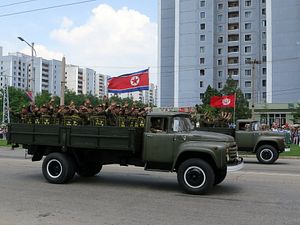At a U.S.-China Security and Economic Review Commission (USCC) hearing on April 12, 2017 entitled “Hotspots on China’s Periphery,” Commissioner Jonathan Stivers asked the panel about the likelihood of conflict in one contested area of East Asia leading to conflicts in multiple areas. The three-person panel was unanimous: such a conflict would be contained.
Professor Robert Sutter of George Washington University was the first to answer. He believed that, with the exception of North Korea, no regional actor was “looking for trouble.” And since China certainly wouldn’t want to fight a war on multiple fronts, the likelihood of such a war was small. The other two witnesses, Tim Heath and Marc Cozad (both researchers at RAND), concurred with Sutter’s assessment.
At first blush, this is a very sensible answer. There is broad consensus within the China field that, if at all possible, China will seek to avoid even one fight, much less multiple conflicts. We might even construe the commissioner’s question as sensationalistic, speculating wildly about an unlikely, worst-case scenario. But as North Korea claims it is under threat and the U.S. security establishment places added emphasis on the Hermit Kingdom, it is a fitting time to relook these assumptions, and they don’t look good.
The experts are focusing too narrowly on the object of their study: China. China is indeed unlikely to seek out conflict on multiple fronts. But Japan and North Korea may well choose to uphold their national interests through the use of force. And close behind them are Australia and even Singapore.
Sutter pointed out that any fighting at all risks war. Should the forces of one or more great powers begin fighting, national honor and interest will demand that they fight to a decisive conclusion. And while he did say none of the players are looking for trouble, he felt it necessary to add the caveat that he could not be so sure that statement applied to North Korea.
Tim Heath affirmed the lowered the cost of entry and pointed to a growing concern in China over conflict with Japan. There is little reason to believe that Japan would sit out a Taiwan conflict quietly and any fighting risks war, according to Heath.
We should remember as well that space, cyber, and other domains will be fully in play, threatening to harm and possibly enmesh those who would otherwise be bystanders. Even hacktivist collective Anonymous has issued a somewhat dire geopolitical synopsis.
Although East Asia has not seen a major conflict for many years, decision makers on all sides must be mindful of the potential ramifications of their actions.
The views expressed are my own and do not reflect the official policy or position of the U.S. Navy, Department of Defense, or the U.S. Government.
































